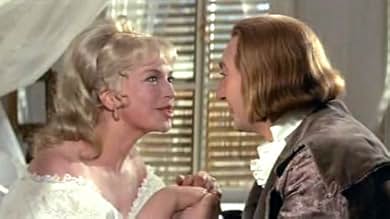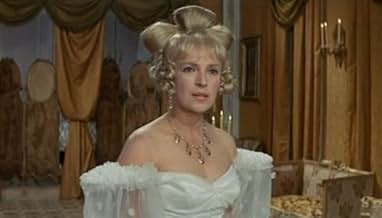Klara Luchko(1925-2005)
- Actress
- Writer
- Soundtrack
Klara Luchko was a Soviet Russian and Ukrainian actress best known as
Dasha, a Cossack woman in the popular movie
Cossacks of the Kuban (1950) by
director Ivan Pyrev.
She was born Klara Stepanovna Luchko on 1 July 1925, in a village near Poltava, Ukraine, Soviet Union, into a peasant family. Her father, Stepan Grigorievich, and mother, Anna Ivanovna, both worked for a Soviet collective farm. During WWII, young Luchko with her mother were evacuated to Central Asia, while her father was fighting in the front-lines against the Nazis. During the war time, Klara Luchko became obsessed with movies and acting, so in 1943, she came to Almaty, Kazakhstan, where the Soviet State Film Institute (VGIK) was evacuated during WWII. Although Luchko was exhausted, hungry and unprepared, she improvised brilliantly and passed the entrance exam with flying colors. She studied acting under Sergey Gerasimov, graduating in 1948 as actress. That same year she made her film debut as Marina in The Young Guard (1948) by director Sergei Gerasimov.
In 1951, Klara Luchko was awarded the State Stalin's Prize for her role in the popular movie Cossacks of the Kuban (1950) by director Ivan Pyrev. During the 50s, Klara Luchko was the official face of the Soviet film industry: she represented Mosfilm for the first time at the 1952 Cannes film festival. Later, Luchko and the ensemble of actresses in A Big Family (1954) won the Best Actress award at the 1955 Cannes film festival. She also was member of official Soviet delegations at various international events, such as, the Edinburgh festival and other show business events in the 50s. Her film career spanned over fifty five years and she worked with such directors, as Iosif Kheifits, Sergei Gerasimov, Yan Frid, Ivan Pyryev, Adolf Bergunker, Eldar Shengelaya, and other notable Russian directors.
Klara Luchko was designated People's Actress of the USSR and received other awards and decorations from the Soviet and Russian government. In 2000 she was named "Woman of the Millennium" and received a lifetime awards from the Russian Actors Guild. Klara Luchko was married twice and had a daughter. She was living in Moscow, Russia. She died of a heart failure at age 79, on 26 March, 2005, and was laid to rest in Novodevichy cemetery in Moscow, Russia. A square in the Cossack town of Kurganinsk in the South of Russia, where she played her best known role as a Cossack woman, was named after Klara Luchko.
She was born Klara Stepanovna Luchko on 1 July 1925, in a village near Poltava, Ukraine, Soviet Union, into a peasant family. Her father, Stepan Grigorievich, and mother, Anna Ivanovna, both worked for a Soviet collective farm. During WWII, young Luchko with her mother were evacuated to Central Asia, while her father was fighting in the front-lines against the Nazis. During the war time, Klara Luchko became obsessed with movies and acting, so in 1943, she came to Almaty, Kazakhstan, where the Soviet State Film Institute (VGIK) was evacuated during WWII. Although Luchko was exhausted, hungry and unprepared, she improvised brilliantly and passed the entrance exam with flying colors. She studied acting under Sergey Gerasimov, graduating in 1948 as actress. That same year she made her film debut as Marina in The Young Guard (1948) by director Sergei Gerasimov.
In 1951, Klara Luchko was awarded the State Stalin's Prize for her role in the popular movie Cossacks of the Kuban (1950) by director Ivan Pyrev. During the 50s, Klara Luchko was the official face of the Soviet film industry: she represented Mosfilm for the first time at the 1952 Cannes film festival. Later, Luchko and the ensemble of actresses in A Big Family (1954) won the Best Actress award at the 1955 Cannes film festival. She also was member of official Soviet delegations at various international events, such as, the Edinburgh festival and other show business events in the 50s. Her film career spanned over fifty five years and she worked with such directors, as Iosif Kheifits, Sergei Gerasimov, Yan Frid, Ivan Pyryev, Adolf Bergunker, Eldar Shengelaya, and other notable Russian directors.
Klara Luchko was designated People's Actress of the USSR and received other awards and decorations from the Soviet and Russian government. In 2000 she was named "Woman of the Millennium" and received a lifetime awards from the Russian Actors Guild. Klara Luchko was married twice and had a daughter. She was living in Moscow, Russia. She died of a heart failure at age 79, on 26 March, 2005, and was laid to rest in Novodevichy cemetery in Moscow, Russia. A square in the Cossack town of Kurganinsk in the South of Russia, where she played her best known role as a Cossack woman, was named after Klara Luchko.
























